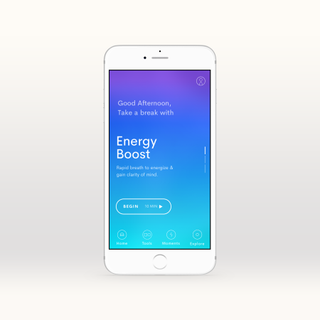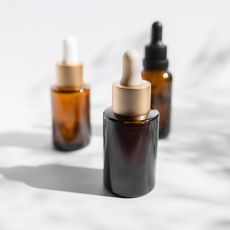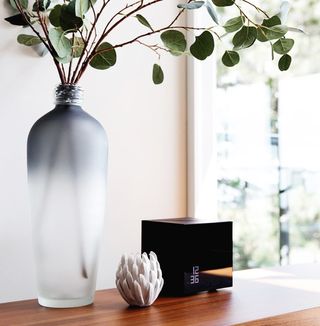I Was Secretly Repressing My Stress for Years—and You Might Be Too

I like to think of myself as a "chill girl"—the type of person who's not easily worked up. "You can't overwhelm me," is something I've said to my boss on more than one occasion. "Always trust that I can handle anything and be totally fine."
Only recently did I discover that I was not somehow born resistant to mental and emotional stress. It's simply that I refuse to acknowledge it. Stress denial is a common phenomenon, especially among Americans, who romanticize overworking and continue to turn their noses up at mental health care as a cultural rule. My personal rationale was that from the outside, my life was objectively happy and comfortable, so what right did I have to be stressed? Even if I was stressed, what benefit would there be to indulging it? It took a conversation with an acupuncturist for me to realize that a traumatic breakup, death of an important family member, manic work schedule, and overwhelming social calendar were all putting me at about an eight out of 10 on the stress scale—information that, as a stress denier, I had no idea what to do with.

Denial of negative emotions is a widespread and insidious phenomenon. Licensed professional counselor Emily Roberts, author of Express Yourself: A Teen Girl's Guide to Speaking Up and Being Who You Are, explains, "People repress their stress due to the inability to check in with their emotions because they've been told by society that feelings are invalid. Also, they've been conditioned to repress anything that's uncomfortable due to the fear that their emotions will be too overwhelming and they won't know what to do when this intensity arises." In a way, it's a valid fear because stress can sometimes be a sign of something deeper. "Often, stress is the surface response, but the deeper feeling is sadness or grief, and these core emotions need to be managed and worked through before deeper healing can take place," comments Susan McClanahan, Ph.D., chief clinical officer at Denver's Eating Recovery Center. "If we avoid the painful feelings, we will feel less joy as well. And over time, we will begin to feel disconnected from our sense of self, our compass of our intrinsic values, and our core relationships will begin to suffer as well."
A more spiritual way of thinking about stress repression comes from Sahara Rose, a certified holistic nutritionist and an expert in Ayurveda. "People refuse to acknowledge their stress for a number of reasons, depending on their unique mind-body type, called a dosha in Ayurveda," she says. Personally, I identify with the mind-body type called Vata, or "airy," which Rose describes as people who distract themselves from stress with new projects, activities, and travel. "Since they tend to work in creative fields, they tell themselves that since they're doing what they love, they 'can't' be stressed, even if their schedule is demanding," she says. "They'll often go over the top and do far more than what was expected for their creative pursuits, leaving them burnt out." Me, in a nutshell.
There are also Pitta, or "fiery," types, who are highly ambitious and refuse to acknowledge their stress because they don't want anything to get between them and their goals. Kapha, or "earthy," types often deny their stress because they are focused on supporting other people. "They hold it down in their households, offices, and communities and are afraid if they show how overwhelmed they are, there won't be anyone there to support them," says Rose.

The problem with repressing your stress, no matter what the motivation, is that ignoring it will never make it go away. The physical symptoms of stress will remain until you acknowledge and address them. Many stress repressors, including myself, are disconnected from how mental stress manifests itself in the body. Rose has some advice: "How are you breathing? Short and shallow? That's stress. Notice your temperature. Are you feeling hot and flustered? That's also stress. Notice your heart rate. Is it going a million miles an hour? That's your stress levels. Notice your shoulders. Are they clenched up to your ears? That's you holding the weight of the world on your shoulders. Notice your jaw. Is it clenched and achy when you touch it? That's also you holding onto stress." According to McClanahan, other signals of stress can include sleep disturbances, difficulty concentrating, engaging in self-destructive behaviors like excessive drug or alcohol intake, and withdrawal from social or family activities.
By recognizing these bodily and behavioral indicators, one is better able to identify stress even when they are not mentally conscious of it. As Roberts adds, you can deny your negative emotions all you want, but the body doesn't lie. Tuning into these physical signs is the only way to become aware of your stress so you can mitigate it and become the "chill girl" you want to be.
Learning how to ease your stress when you've been repressing it for so long is a tricky task, but Rose, Roberts, and McClanahan have a few easy techniques. The first simply has to do with deep breathing. "It takes six slow and deliberate breaths to recalibrate your body," says Rose. "Just that and you'll notice a big difference."
Roberts recommends going a step further and incorporating a mindful deep breathing practice into your daily life, even during times that aren't particularly stressful, just to get accustomed to using your breath as a healthy de-stressing mechanism. "When you have a short or long daily practice, your brain becomes more wired to use the skills rather than succumbing to the stressful emotions that can consume you," she explains. "I often recommend a three- to five-minute mindfulness practice every day for a few weeks from an app or from a YouTube video." (The Inscape and Headspace apps are Byrdie-approved.)
Other simple de-stressing practices include developing a yoga routine, gratitude journaling, spending time with pets, and taking a few moments every day to plug out of social media and in with nature. "Get outside. Touch a plant. If you can, take your shoes off and walk on the grass/dirt/sand," says Rose. "This will ground you and connect you with the negative ions on the Earth, rebalancing your electromagnetic charge which is scientifically proven to reduce stress." Recently, I've been taking 20 minutes after lunch to sit outside on the terrace at my office with my phone on airplane mode and calm music playing. When you feel overwhelmed by work or another real-life experience, don't default to distracting yourself on your phone. "We often go to Instagram when we feel stressed, when it actually adds to it," says Rose. "Delete your apps for a while and let your mind refresh."
I've also found success with aromatherapy. I have an essential oil diffuser in my bedroom and at my desk at work. (Vitruvi and Saje make really chic ones.) I make a habit of basking in a calming essential oil blend, like lavender and geranium, all throughout the day, which has a noticeable soothing effect on my mood.
Do you have experience with stress denial? What do you do about it? DM me your thoughts on Instagram at @amanda_montell!
Disclaimer
This article is provided for informational purposes only and is not intended to be used in the place of advice of your physician or other medical professionals. You should always consult with your doctor or healthcare provider first with any health-related questions.

Who's your beauty icon?
Tie among Linda Rodin, Hari Nef, and David Bowie.
Who are your 5 favorite people to follow on Instagram?
@petracollins @katiejanehughes @alwaysjudging @bonnyrebecca @hotdudesreading
What's the beauty essential you can’t live without?
If I have some brow gel and Sisley's Phyto-Lip Twist, I'm good to go forever.
What's your desert island album?
Death Cab for Cutie's Transatlanticism
What's your favorite Byrdie.com story?
Game of Thrones's Nathalie Emmanuel looks so achingly beautiful in our feature with her that I think it's gonna have to be that!
-
 This Founder Shares Why We Should Start Celebrating Rest
This Founder Shares Why We Should Start Celebrating RestBurnout is nothing to be proud of.
By Kia Topps
-
 I Asked J.Lo's Trainer for His Very Best Fitness Tips
I Asked J.Lo's Trainer for His Very Best Fitness TipsGunnar Peterson has thoughts on how to get moving this season.
By Kia Topps
-
 This Style Influencer Turned Founder Shares Her Favorite Ways to Start the Day
This Style Influencer Turned Founder Shares Her Favorite Ways to Start the DayA morning routine from London.
By Candice Aman
-
 13 Products That Will Step Up Your Self-Care Game From Home
13 Products That Will Step Up Your Self-Care Game From HomeGet that glow from within.
By Natalie Gray Herder
-
 These 8 Foods Are the Worst for Rosacea—Here's What to Eat Instead
These 8 Foods Are the Worst for Rosacea—Here's What to Eat InsteadControl those flare-ups.
By Sarah Yang
-
 If You're Super Stressed Out, These 17 Things Can Make You Feel Better
If You're Super Stressed Out, These 17 Things Can Make You Feel BetterTry them.
By Sarah Yang
-
 These Essential Oils Will Relieve Your Stress ASAP
These Essential Oils Will Relieve Your Stress ASAPBreathe in. Breathe out.
By Sarah Yang
-
 I Host a Mental Health Podcast—Here Are 5 Important Things I've Learned From It
I Host a Mental Health Podcast—Here Are 5 Important Things I've Learned From ItGive Been Better… HBU? a listen.
By Sarah Yang



